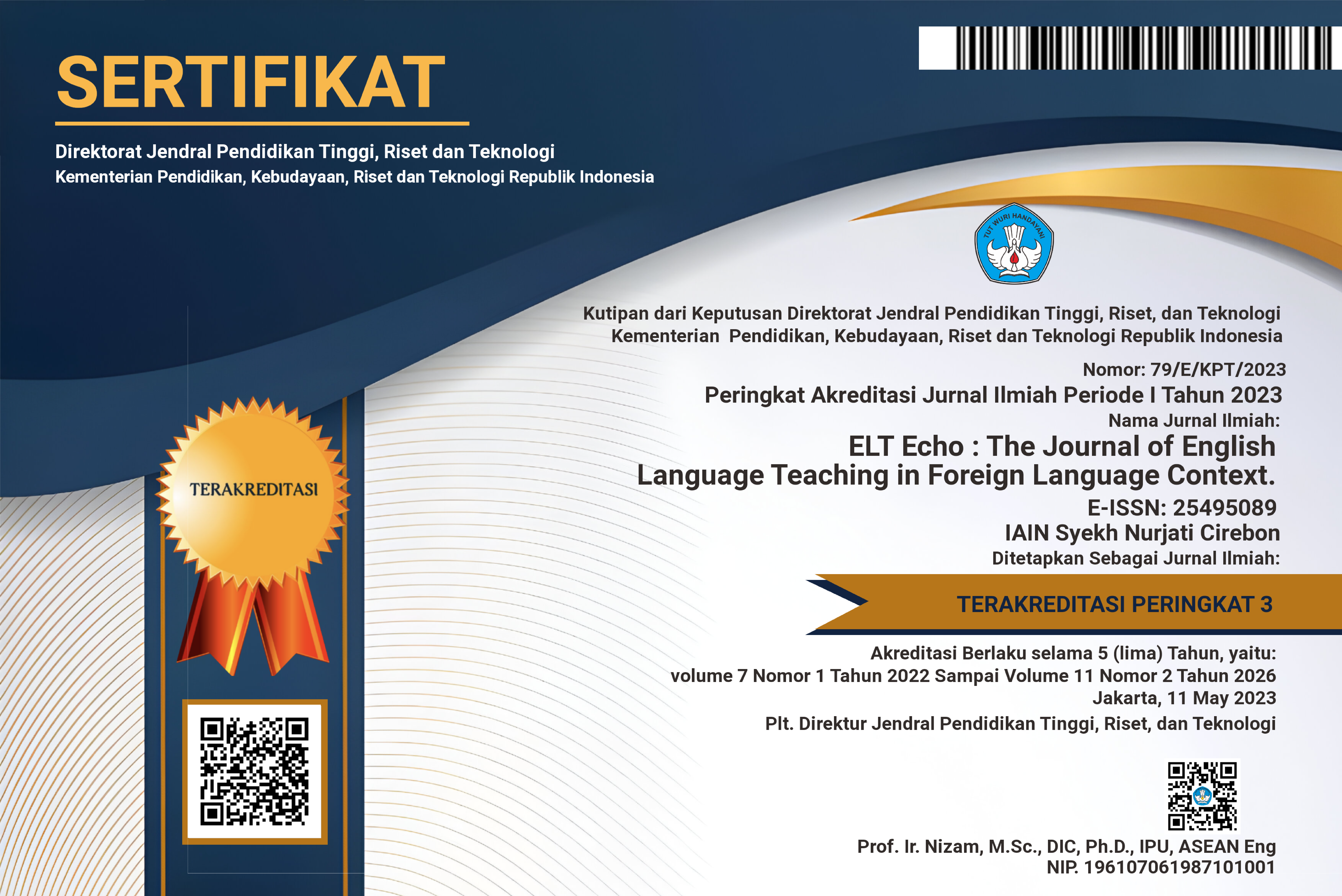EXAMINING PHILOSOPHICAL VIEWS UNDERLYING THE DESIGN OF ENGLISH TEACHER’S LESSON PLAN AND THE TEACHING MATERIALS
(1) State University of Surabaya
(*) Corresponding Author
Abstract
Keywords
Full Text:
PDFReferences
Ayuni, F. N. (2015). Pemahaman Guru terhadap Pendekatan Saintifik (Scientific Approach) dalam Pembelajaran Geografi. Jurnal Pendidikan Geografi, 15(2), 1-7.
Aziz, R. (2016). Kerangka Dasar dalam Pengembangan Kurikulum 2013. Jurnal Inspiratif Pendidikan, 5(2), 286-292.
Bahri, S. (2011). Pengembangan Kurikulum: Dasar dan Tujuannya. Jurnal Ilmiah Islam Futura, 11(1), 15-34.
Bahri, S. (2018). Pengembangan Kurikulum Berbasis Multikulturalisme di Indonesia (Landasan Filosofis dan Psikologis Pengembangan Kurikulum Berbasis Multikulturalisme). Jurnal Ilmiah DIDAKTIKA 19(1), 69-88.
Barrow, R. & Woods, R. (2006). An Introduction to Philosophy of Education, 4th Edition. Routledge.
Haerazi. (2018). Landasan Filosofis Pembelajaran Bahasa Inggris di Indonesia. Jurnal Ilmu Sosial dan Pendidikan, 2(1), 391-396.
Hanif, M. (2014). Tinjauan Filosofis Kurikulum 2013. Insania, 19(1).
Hastuti, S. & Zuchdi, D. (2020). Keselarasan Landasan Filosofis Buku Ajar ‘Bahasa Inggris’ dengan Landasan Filosofis pada Kurikulum 2013. Wacana Akademika, 4(1), 64-73.
Kemendikbud. (2014). Implementasi Kurikulum 2013. Kemendikbud.
Kemendikbud. (2018). Peraturan Menteri Pendidikan dan Kebudayaan Republik Indonesia Nomor 37 Tahun 2018. Kemendikbud.
Krippendorff, K. (2004). Content Analysis: An Introduction to Its Methodology, 2nd ed. Sage Publications.
Noddings, N. (1998). Philosophy of Education. Stanford University Press.
Sikandar, A. (2015). John Dewey and His Philosophy of Education. Journal of Education and Educational Development, 2(2), 191-201.
Ridwanudin, D. (2015). Filsafat Pendidikan sebagai Basis Penguatan Profesionalisme Guru. Jurnal Qathruna, 2(2), 57-74.
Tan, C. (2006). Philosophical perspectives on education. Prentice Hall.
Thohir, M. A. et al. (2017). A Comparative Study on Sheikh Az-zarnuji Thought and Idealism in the Philosophy of Education. Epistemé, 12(2), 411-433.
Suarga. (2017). Kerangka Dasar dan Landasan Pengembangan Kurikulum 2013. Jurnal Inspiratif Pendidikan, 6(1), 15-23.
Suherdi, D. (2016). Pendidikan Bahasa Bagi Keunggulan Bangsa: Keniscayaan Rekonstruksi Pembelajaran Bahasa dalam Pendidikan Abad ke-21. UPI Press.
Usman, A. H. et al. (2017). Humanism in Islamic Education: Indonesian References. International Journal of Asia Pacific Studies, 13(1): 95-113.
Uys, L. R. & Gwele, N. S. (2005). Curriculum Development in Nursing: Process and Innovations. Routledge.
DOI: 10.24235/eltecho.v7i1.9722
Article Metrics
Abstract view : 86 timesPDF - 20 times
Refbacks
- There are currently no refbacks.
Â
This Journal is indexed by:
Â

This work is licensed under a Creative Commons Attribution 4.0 International License.










